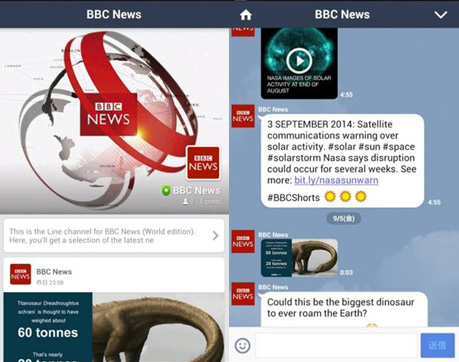
BBC News has launched an account on instant messaging app Line today, the latest in a series of experiments with content distribution through chat apps.
BBC's Line account is its first international news channel inside a chat app, "partly to try and make an assessment of whether there is value in a global news proposition," said Trushar Barot, apps editor, BBC World Service and Global News.
He said the Line account would send out a couple of push alerts a day, and post more updates to its homepage. Line passed 400 million registered users in April, and Barot said it was partly chosen for this experiment because it would allow the BBC to send through more video content.
He said Line users have access to higher data plans compared to other apps, which enables the BBC to test out short video content inside chat platforms.
Barot told Journalism.co.uk experimenting with video was not something they could do on their WhatsApp account in India or BBM in Nigeria, as local users of the two apps tended to have limited data plans.
"Receiving push alerts with heavy video files would be problematic [in those cases], so that's probably less the case for Line."

Images from BBC News
Barot said the app allows the BBC to expand its chat app content strategy and supplement its usual offering with more video content.
He said the videos published on Line will be created by BBCShorts, a brand of video content originally published on the BBC News Instagram account under the name 'instafax'.
The 15-second video clips have captions "explaining the core aspects of the big story of the day," he said. "So we're going to use that video product to push out on our Line account as well."
BBC News has previously experimented with chat apps in in specific countries or around certain events, using Whatsapp to cover the Indian elections and Mxit to cover the South African elections. The only continuing chat app service before Line was BBC Hausa's BlackBerry Messenger (BBM) channel in Nigeria, according to Barot.
"They've all focused around big news events," he said, "and we linked them in either with our local language services or English language accounts, so this is the next stage on from that."
"This is taking on what we've been doing previously, which focused more on a specific country, to trying out our offering at a global level on a particular platform."
Barot said user engagement rates through chat apps were "particularly high". On Whatsapp, where "pretty much every other message a user gets... is from a friend," some people often replied to the BBC updates with emoticons or a 'thank you' message.Mxit gave us a really interesting opportunity to engage with younger South African votersTrushar Barot, BBC World Service and Global News
"With BBM it's slight different in terms of people have the ability to leave comments similar to Facebook, comments within the BBM channel platform," he said.
"And I think our Hausa service found that as a very useful additional feedback and engagement around its audience, in terms of what they think of certain stories."
Using chat apps has also proven to be an effective way to find new angles and ways to cover stories, according to Barot. The BBC pushed out a poll on Mxit in South Africa to ask its subscribers what the key issues in the election were for them.
While the focus in local media was on leadership, the Mxit poll predominantly featured jobs, health, and education towards the top.
Barot said because Mxit's audience skewed "quite heavily towards a younger South African demographic," the poll helped them nail down the focus of a "specific subject in its own right across our different news programmes".
"This gave us a really interesting opportunity to engage with younger South African voters," he said.
Free daily newsletter
If you like our news and feature articles, you can sign up to receive our free daily (Mon-Fri) email newsletter (mobile friendly).
Related articles
- Learning to explain well, with BBC News presenter Ros Atkins (part two)
- Learning to explain well, with BBC News presenter Ros Atkins (part one)
- Digital News Report 2023: trust, news avoidance and interest in the news
- Digital News Report 2023: Five trends to watch in the UK
- Dougal Shaw, senior video innovation journalist of BBC News, on creating news series









